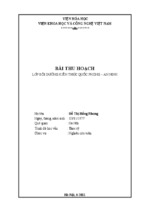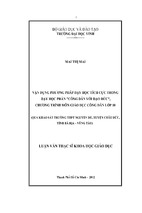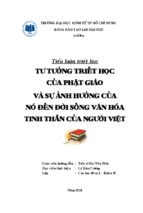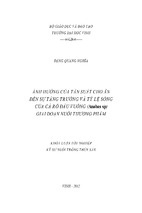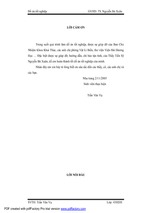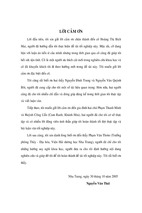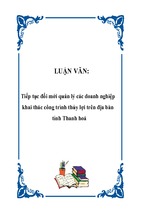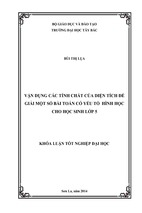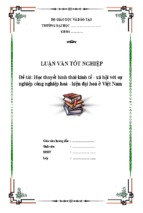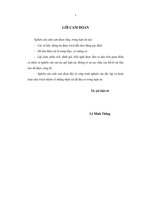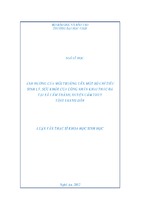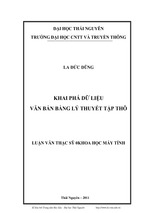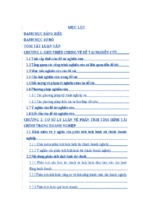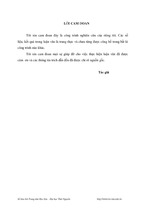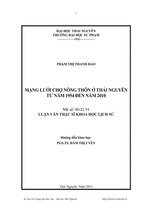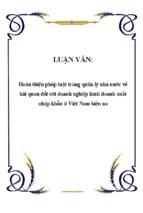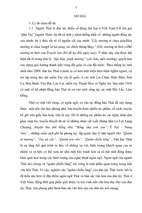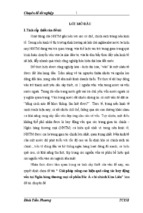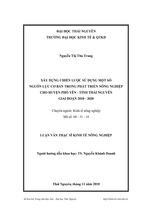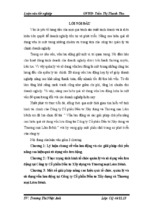CANTHO UNIVERSITY
SCHOOL OF EDUCATION
ENGLISH DEPARTMENT
THE EXPRESSION OF HUMAN SURVIVAL
INSTINCT IN ENGLISH LITERATURE
B.A.Thesis
Supervisors: Nguyễn Thị Nguyên Tuyết, MA
Nguyễn Hải Quân, MA
Researcher: Tăng Thị Vân
Code: 7032561
B.A Class
NN0354A3
Course 29
Cantho, June 2007
i
CONTENTS
Contents ................................................................................................................................ i
Acknowledgements ............................................................................................................ iii
Abstract ............................................................................................................................... iv
Chapter 1 Introduction ..................................................................................................... 1
1.1. Rationale ................................................................................................................ 1
1.2. Research aims ........................................................................................................ 2
1.3. Organization of the thesis ..................................................................................... 3
Chapter 2 Literature Review ............................................................................................ 4
2.1. Definition of instinct: ............................................................................................ 4
2.2. Types of Human instinct ...................................................................................... 5
2.2.1. The instinct of civilization: ............................................................................. 5
2.2.2. The instinct of savagery .................................................................................. 5
2.3. What does survival mean in general? ................................................................. 6
2.3.1. Definition of survival....................................................................................... 7
2.3.2. The grades of survival: ................................................................................... 7
2.4. Why should survival instinct be limited to human beings? .............................. 8
2.5. Summaries of the three selected works ............................................................... 9
2.5.1. The summary of Lord of the Flies, written by William Golding................. 9
2.5.2. The summary of Heart of Darkness, written by Joseph Conrad .............. 10
2.5.3. The summary of Jane Eyre, written by Charlotte Bronte ......................... 11
Chapter 3 Research Methodology .................................................................................. 14
3.1. Research questions .............................................................................................. 14
3.2. Materials .............................................................................................................. 14
3.3. Procedure ............................................................................................................. 14
Chapter 4 Results............................................................................................................. 15
4.1. The expression of human survival instinct in the three selected works......... 15
ii
4.1.2. The expression of the instinct of civilization in the three selected
novels ............................................................................................................................. 15
4.1.2.1. The expression of the instinct of civilization in Lord of the
Flies ............................................................................................................................ 15
4.1.2.2. The expression of the instinct of civilization in Jane Eyre ................ 18
4.1.2.3. The expression of the instinct of civilization in Heart of
Darkness .................................................................................................................... 18
4.1.3. The expression of the instinct of savagery in the three selected
works ............................................................................................................................. 19
4.1.3.1. The expression of the instinct of savagery in Lord of the Flies......... 19
4.1.3.2. The expression of the instinct of savagery in Heart of
Darkness .................................................................................................................... 20
4.1.4. The struggle between the instinct of civilization and the instinct of
savagery ........................................................................................................................ 20
4.1.4.1. The struggle between Ralph and Jack ................................................ 21
4.1.4.2. The struggle between Kurtz and himself............................................ 23
4.2. In what living situation is the human survival instinct clearly
depicted? ........................................................................................................................... 25
4.3. What are the effects of survival instinct on human beings? ........................... 26
Chapter 5 Conclusion- Implications- Limitations- and Suggestions for
Further Research ............................................................................................................. 28
5.1. Conclusion and Implication ............................................................................... 28
5.2. Limitations ........................................................................................................... 29
5.3. Suggestions for Further Research ...................................................................... 29
References .............................................................................................................................
Appendices ...........................................................................................................................
iii
iv
ACKNOWLEDGEMENTS
First of all, I wish to send my deep gratitude to the teaching staff of English
Department who taught me enthusiastically from the first year until now and gave
me an opportunity to conduct my research.
The next person I would like to express my special thanks is Ms. Truong
Thi Kim Lien who taught me literature in the third year. Thanks to her lessons, my
curiosity toward the theme “human survival instinct” is increased day by day, and
it stimulates me to write this paper. Besides, she also provided me with helpful
materials related to the topic and taught me how to understand a literary work.
Last, I would like to show my deep gratitude to Ms. Nguyen Thi Nguyen
Tuyet and Mr. Nguyen Hai Quan, who enthusiastically guided me to complete my
research. They helped me find out many useful websites, suggested me a lot of
interesting ideas, and corrected word choices and errors so that I could finish my
paper on time. They particularly devoted their time and energy revising my thesis.
v
ABSTRACT
This paper aims to study how human survival instinct is expressed in
English literature as well as what effects it has on human beings. It is a descriptive
research in which various viewpoints on human survival instinct are explored. The
paper focuses on instinct of civilization and savagery, the two most basic types of
human survival instinct. Psychological theory proposed by Sigmund Freud is
adopted as the framework for analyzing and contrasting the expression of human
survival instinct in three selected novels: Lord of the Flies (William Golding),
Heart of Darkness (Joseph Conrad), and Jane Eyre (Charlotte Bronte). The
research would provide the students majoring in English with deeper
understandings about the human survival instinct when they study literature
vi
CHAPTER 1
INTRODUCTION
There are three parts in this chapter. The first part explains the reason why
this thesis is conducted. The research aims as well as the research questions will
be included in the second part. The last one will introduce the leaders the way in
which this paper is organized.
1.1. Rationale
There are some rationales that encourage me to conduct this research:
When I studied at high school, my favorite subject was literature. Through
literature, I learnt many interesting things. One of them was about the human
survival instinct. I remember that after studying the story “Rừng Xà Nu” written
by Nguyễn Trung Thành, I was so impressed by the wounded hands of Tnu- the
main character of the story. I wonder many times that how Tnu can live in such
hopeless situation: his wife and his son all died in the war, and his hands were also
damaged. At last, I realized that it depends on our survival instinct. When we have
the goal in life; we will try our best to overcome difficulties. It’s similar to Tnu’s
case. He wanted to revenge for his family and his fatherland; therefore, he had a
motivation to survive.
vii
One more time, the human survival instinct came to my mind when I had a
chance to study the subject “English literature” last year. Through the three novels
of Joseph Conrad, William Golding, and Charlotte Bronte, I understand many
things about human survival instinct. I realized that besides its good effects, we
would also receive its bad ones. I wonder how people can react like that. Do they
feel more comfortable and happier when they do such terrible things? I think it’s
out of their control, they only know that they must try their best to survive even it
will make them worse.
For me, I’m really interested in human survival instinct. I wonder how the
grass can grow well without being taken care of, while the rose cannot survive if
we don’t water it regularly. I wonder how a boy living in difficult situations can
take success more easily than the one living in a rich family. These questions
stimulate my curiosity, and I spend a lot of time to find the answer. Therefore,
after studying English literature, I want to do the research on the topic human
survival instinct. I hope that, through my research I could find the answer for my
questions about the mystery of human survival instinct.
1.2. Research aims
In my work, I am going to provide the readers with small amount knowledge
about the theme “human survival instinct” through the three selected works in
English literature. In other words, I wish to study the expression of survival
instinct in human beings. I hope to understand in what living situations the
survival instinct can be clearly seen, and its effects on human beings.
viii
In my paper, hopefully, the readers may clearly see the expression of the
human survival instinct in the three selected works. There are two types of
instinct: civilizing instinct and barbarizing instinct. The civilizing instinct is the
instinct to live by rules, act peacefully, and follow the moral commands, while the
barbarizing instinct is the instinct to gratify ones’ desire, and treat the others as
their servants. In life, there is a struggle between the instinct of civilization and the
instinct of savagery. This struggle occurs when people live in the extremely hard
living condition. In those situations, human beings will struggle to maintain the
order among them or they will lose their identity and live wildly as animals. In this
paper, the terms civilizing and barbarizing instinct are used interchangeably with
instinct of civilization and savagery to refer to the same notions.
1.3. Organization of the thesis
There are five chapters in this paper. In chapter one, the reasons motivating
me to carry out the research, the research aims, and the organization of the thesis
will be included. The second chapter will analyze, contrast, and compare ideas
from previous studies related to the topic. Chapter three will state the research
questions, materials, and procedure used to reach the research aims. Chapter four
will present four parts. In part one, the summaries of the three selected works will
be introduced. The expression of the civilizing instinct and barbarizing instinct as
well as the conflict between these two types of instincts will be studied in the
second part. Part three will answer the question: “In what living situations is the
human survival instinct clearly depicted?” The last part will discuss the effects of
ix
survival instinct on human beings. The last chapter aims at giving a conclusion,
discussing limitations of the thesis, and providing some suggestions for further
research.
CHAPTER 2
LITERATURE REVIEW
In this section, I start by reviewing the definition of instinct and survival as
well as limited my thesis in the scope of human survival instinct.
2.1. Definition of instinct:
x
According to the encyclopedia “instinct is the inherit disposition of a living
organism toward a particular behavior”. In terms of human, the instinct can be
considered through human’s emotions, sexual driven and other bodily function as
these are largely biological determined.
For example, selfishness is a kind of human instinct. Because of their own
benefits, people do not want to share their experiences with others. They think that
if they do so, they will be more successful than the others. In other cases, in
difficult situations, people just think about themselves, so they can do any evil
things and they do not care of the others’ life.
Another example of instinct is aggressive tendencies “Aggressive
tendencies which are ingrained into the psyche, that act and react as an instinct.”
(Brian Walker, 1998) That means when people encounter the threats of nature or
the difficulties, they intend to act violently to solve the problem. This action is
considered as a self-defense, but in another case, it could be considered as crime.
There are many ways to classify the human’s instinct such as sexual
instinct, food instinct, destructive instinct, etc…. However, in my research I will
concern on the instinct of civilization and the instinct of savagery.
2.2. Types of Human instinct
2.2.1. The instinct of civilization:
The instinct of civilization means, “The instinct to live by rules, act
peacefully, follow moral commands, and value the good of group on the one
hand”). On the other hand, “it expects to prevent the worst atrocities of brutal
xi
violence by taking upon itself the right to employ violence against criminals.”
(Sigmund Freud, 1930) People all know that if they want to survive, they need to
get together to make a society. In that society, they create rules; follow moral
commands and the values. Thanks to the instinct of civilization, people can live
together peacefully and happily. However, in life two aspects always exist
together, if the instinct of civilization is the good side, the instinct of savagery is
considered as the bad one in life.
2.2.2. The instinct of savagery
“The instinct of savagery means the instinct to gratify one’s immediate
desires, act violently to obtain supremacy over others and enforce one’s will on
others.” This instinct is associated with evils. People act cruelly to satisfy their
own desires. They want to threaten the order of society and get the power over the
others. William Golding stated, “Man is born to sin.” (Golding, qtd in Carey 174),
or the Latin expression also stated that “Homo homini lupus.” Which means “Man
is wolf to man.” These two expressions refer to a “phenomena man’s regression
into a state” of barbarism and animalism. It means man wants to become his own
God. He wants to create his own society and make rules over others. He willingly
sacrifices people around him to impose himself and to satisfy his own desires.
The above idea can be illustrated by some following examples:
First, war is considered as crime. In war, people can kill each other and do
many terrible things to hurt others like animals. In this situation, the rules and
moral commands are broken.
xii
Another example is slavery. Slaves must suffer many miseries; they don’t
have any right even the right to live and the right to eat. Their life depends on their
masters and they are treated like animals. Slavery is considered as the worst
atrocities in life.
Because of the brutality of savagery, people try to eliminate from the
society. Therefore, there is a conflict between the instinct of civilization and the
instinct of savagery. Sigmund Freud once said, “Civilization presents the struggle
between Eros and Death, between the instinct of life and the instinct of
destruction, as it works itself out in the human species.” According to Freud, life’s
instinct is “the process of the combination single human individuals, and after
those families, races, people and nations, into one great unity, the unity of
mankind.”(Sigmund Freud, 1918). From the above idea, life’s instinct can
represent the instinct of civilization. This instinct permits human beings to create a
wonderful place to live and to work. In contrast, the destructive instinct can be
understood as the instinct of savagery. Because of this instinct, people want to
humiliate torture and kill each other. Therefore, life’s instinct and destructive
instinct always struggle with each other. If the life’s instinct is stronger, all evils
will be eliminated from the society, then people can live happily and the world
will become a wonderful place for us to live. On the contrary, if the destructive
instinct is stronger, people cannot control their actions and the world will be
destroyed by evils.
2.3. What does survival mean in general?
xiii
2.3.1. Definition of survival
According to English dictionary (2006), survival means “the fact or state of
continuing to live or exist, especially in difficult situation.” In concern with the
human survival, we mean individual survival, the survival of personality and
character.
Therefore, survival can be understood as the ability of human beings to
adjust the difficulties. Robinson (the main character in novel Robinson on the
deserted Island) is an example, living alone in the island; he must try his best and
do many things to survive. Or the case of wolf girls Kamala and Amala, they live
with the wolfs and do not have any sense about the civilization for a long time.
Therefore, to survive, their body changes so much so that they can adapt to the
wolf’s society. For instance, their jaws had undergone some sorts of change in the
chewing of bones. They could sit on the ground squatting down. Their eyes had a
peculiar blue glare, like that of a cat or a dog, etc…
2.3.2. The grades of survival:
Sir Oliver Lodge (1916, p71) stated “There may be many grades of
existence, many grades of personality, and accordingly there may be many grades
of survival.” To understand this idea, we will clarify the questions: What are the
grades of existence? What are the grades of personality? In addition, what are the
grades of survival?
To answer this question, we will consider the following examples:
xiv
Observing the hive of bees; we can see that each bee has its own life and its
own existence. It is really short and strenuous. However, each of them also
willingly sacrifices itself for the good of the community. They will find the
specific activity to contribute to the hive such as if wax is needed, they proceed to
make it. If wax is provided, they proceed to shape it. If they find already shaped,
they fill it with honey.
Consider another example; we know that our body is composed of cells.
Each cell has its own existence. For example, the white corpuscles in the blood
have their own life. They have moved with spontaneity, they assimilate and digest
and excrete, they subdivide and increase in numbers. They have many of the
attributes of independent life. They also play a part in human body. They keep the
whole body in health and will sacrifice themselves for that purpose.
In the society, man exists in his own life and his own area. He works to
support his life and to satisfy his needs. However, he also takes a responsibility in
the society. He must join into the society for making a safe place to live and
cooperate with others to fight against the enemy or sit round to solve many
universal problems. In short, when the society needs, man willingly sacrifices
himself.
Therefore, the grades of survival mean a small and trivial thing may survive
in a small and trivial way.
2.4. Why should survival instinct be limited to human beings?
xv
Both human beings and animals have survival instinct. However, for
animals, their survival instinct means the instinct to find foods, to give birth,
etc…. which is simple. Animals do not have complicated feelings and emotions
like human beings. In contrast, when we mention human survival instinct, we
mean many things such as emotions, behaviors, sexual drives and so on. Human’s
reactions toward the survival instinct can be various. It is not the same as animals’
reactions. The human’s reactions may be good, or may be bad or neutral while the
animals’ reactions are almost always bad.
In the scope of my thesis, I am going to focus on the survival instinct of
human beings because I want to understand the expression of survival instinct in
human beings through literature and to see whether it is the same or difference
from the reality. The thesis also explores the reactions of human toward the
survival instinct whether it is good or bad, and the factors that make people react
such ways.
2.5. Summaries of the three selected works
2.5.1. The summary of Lord of the Flies, written by William Golding
Lord of the Flies (published in 1954), by William Golding, is a story about
a group of English boys whose plane is shot down when they escape from World
War I. Being elected as a leader, Ralph chooses Jack as the leader of the hunters
for finding the food, and he also convinces the others to light a signal fire for
calling the help. However, the boys seem to forget their duties and begin to play.
xvi
As a result, the fire burns out of their control and one of the youngest boy
disappears who is speculated having burn to death.
At first, the boys enjoy their life without maturity, they play and joke
together and forget their hopeless situation. Besides, the hunters who are led by
Jack have trouble catching the pig, and Jack seems to like the act of hunting more
than the act of keeping the signal fire. One day a ship passes by the island, no one
knows except Ralph and Piggy. They try to beckon the ship but in vain. At last
they realize that the signal fire has burned out and maintaining it in light is the
hunters’ responsibility. To go forward to the hunters’ group in anger, Ralph yells
at Jack, the group’s leader; because Jack lets the signal fire burnt out. As a result,
there is a struggle between Ralph and Jack.
A big problem arises in the island, it is more important than keeping the
signal fire or finding the food. The smallest boys (known as littluns) have a
nightmare and they believe that there is a monster hiding somewhere on the island.
Ralph summons the boys and tries to convince them that there is no real beast or
monster on the island. However, the boys don’t agree and one of them suggests
that the beast may come from the sea.
Late at that night, no soon after the meeting, the aircraft battle takes place
high above the island, and a parachutist drifts to earth near on the signal fire on the
mountain. He is dead. No one knows what happens. When the twins Sam and Eric
wake up they see the twisted form of the dead parachutist and mistake the
shadowy image for the figure of the dreaded beast. They run as quickly as possible
xvii
to inform their news. The boys believe that there is really a monster on the island.
They organize the hunting expedition to search for monster on the mountain. At
first, Ralph disagrees; he persuades the others not to search for the monster. Then
he joins Jack’s group and goes forward to the mountain in order to maintain his
position in the eyes of the group. Ralph, Roger, and Jack start to climb the
mountain, and then Ralph and Roger wait somewhere near the top while Jack
climbs alone to the summit. He returns, breathlessly claiming to have seen the
monster. Once more, the boys confirm the existence of the monster.
At that night, Simon discovers the death of the parachutist after he wakes
up from the nightmare. He runs to the beach to inform this discovery, but the boys
thought he is a monster and kill him with their bare hands and teeth. The following
morning, Ralph and Piggy discuss what they have done. Suddenly, Jack and his
followers attack them and steal Piggy’s glasses. Ralph and Piggy go to the
hunters’ place and try to convince them to accept the truth. However, when Piggy
is talking, one boy named Roger kill Piggy by rolling a boulder from the
mountain.
That night and the following day, Ralph is chased by Jack’s tribe. When he
is nearly exhausted and waits for his death, he sees a naval officer standing over
him. He tells the officer what happened on the island and he begins to weep, as do
the other boys. Moved and embarrassed, the naval officer turns his back so that the
boys may regain their composure.
2.5.2. The summary of Heart of Darkness, written by Joseph Conrad
xviii
Written in 1898 by Joseph Conrad, Heart of Darkness tells the story of the
narrator, Marlow. When he was a young man, he captained a steamship to Congo
River in order to meet Kurtz who is considered as a genius. Kurtz was sent to
Congo as a special emissary of western ideals by the company’s director. It is
rumored that he is ill, and this makes Marlow more curious towards Kurtz.
However, on the way to meet Kurtz, Marlow and his steamship encounter many
difficulties because of the general manager’s harassment. At last, Marlow met
Kurtz in bad health; Kurtz is dying. He convinces Kurtz to go with him, while
Marlow pilots the ship, Kurtz entrusts Marlow with a packet of personal
documents including an eloquent pamphlet civilizing the savages which ends with
a scrawled message that says: “Exterminate all the brutes!” Then Kurtz dies
uttering his last words “The horror! The horror!” After recovering from his
serious illness, Marlow returns to Europe and goes to sees Kurtz’s Intended (his
fiancé). She is still mourning Kurtz despite the fact that he died one year ago. She
asks what his last words were, but Marlow does not tell the truth. He lies that
Kurtz’s last word was her name.
2.5.3. The summary of Jane Eyre, written by Charlotte Bronte
Published in 1847, Jane Eyre by Charlotte Bronte is a story of Jane Eyre, a
young orphan girl. Jane lives with her cruel wealthy aunt, Mrs. Reed. Her only
happiness is that she can listen to her favorite songs and stories from her a servant
named Bessie. One day, because of fighting with her bullying cousin, John Reed,
Jane is imprisoned in the red- room, the room in which her uncle, Mr. Reed died.
xix
After locked in, she believes that she sees her uncle’s ghost; she is so frightened
and fainted. When she wakes up, she finds herself in the care of Bessie and the
kindly apothecary Mr. Lloyd. Mr. Lloyd suggests Mrs. Reed that she should send
Jane to school and Mrs. Reed agrees.
Once at the Logwood School, Jane encounters another difficulty. The
school’s headmaster is Mr. Brocklehurst, a cruel hypocritical and abusive man.
Because of the Mrs. Reed’s notice, Mr. Brocklehusrt pays close attention to Jane,
and he is sure that Jane is really a liar. At Logwood, Jane makes friend with a
young girl named Helen. However, a massive typhus epidemic sweep Logwood
and Helen dies of consumption. After the epidemic, there is big change at the
Logwood, a group of sympathetic gentlemen takes Brocklehurst’s place, and
Jane’s life improves dramatically. She lives at Logwood eight years, six as a
student and two as a teacher.
After teaching two years at Logwood, Jane accepts a governess position at
a manor called Thorn field where she teaches a lively girl named Adele. At Thorn
field, Jane meets a dark and impassioned man named Rochester. Jane saves Mr.
Rochester’s life from a fire one night. According to Mr. Rochester this fire is
started by the drunken servant named Grace Poole. Because Grace Poole continues
to work at the Thorn field, Jane keeps this incident in secret. One day, Mr.
Rochester brings home a beautiful but vicious woman named Blanche Ingram.
Jane feels so depressed because she believes that Mr. Rochester will propose to
Blanche. However, Rochester proposes to Jane and she accepts disbelievingly.
xx
- Xem thêm -


